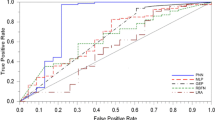Abstract
Background
The ability to provide accurate prognostic and predictive information to patients is becoming increasingly important as clinicians enter an era of personalized medicine. For a disease as heterogeneous as epithelial ovarian cancer, conventional algorithms become too complex for routine clinical use. This study therefore investigated the potential for an artificial intelligence model to provide this information and compared it with conventional statistical approaches.
Methods
The authors created a database comprising 668 cases of epithelial ovarian cancer during a 10-year period and collected data routinely available in a clinical environment. They also collected survival data for all the patients, then constructed an artificial intelligence model capable of comparing a variety of algorithms and classifiers alongside conventional statistical approaches such as logistic regression.
Results
The model was used to predict overall survival and demonstrated that an artificial neural network (ANN) algorithm was capable of predicting survival with high accuracy (93 %) and an area under the curve (AUC) of 0.74 and that this outperformed logistic regression. The model also was used to predict the outcome of surgery and again showed that ANN could predict outcome (complete/optimal cytoreduction vs. suboptimal cytoreduction) with 77 % accuracy and an AUC of 0.73.
Conclusions
These data are encouraging and demonstrate that artificial intelligence systems may have a role in providing prognostic and predictive data for patients. The performance of these systems likely will improve with increasing data set size, and this needs further investigation.





Similar content being viewed by others
References
ESMO Minimum clinical recommendations for diagnosis, treatment, and follow-up of ovarian cancer. Ann Oncol. 2001;12:1205–7.
Thigpen T, et al. Age as a prognostic factor in ovarian carcinoma. Cancer. 1993;71:606–14.
Benedet J, et al. FIGO staging classifications and clinical practice gudelines in the management of gynecologic cancers. Int J Gynecol Obstet. 2000;70:209–62.
van Houwelingen J, et al. Predictability of the survival of patients with advanced ovarian cancer. J Clin Oncol. 1989;7:769–73.
Makar AP, et al. The prognostic significance of residual disease, FIGO substage, tumor histology, and grade in patients with FIGO stage III ovarian cancer. Gynecol Oncol. 1995;56:175–80.
Hogdall E. Cancer antigen 125 and prognosis. Curr Opin Obstet Gynecol. 2008;20:4–8.
Bristow RE, et al. Survival effect of maximal cytoreductive surgery for advanced ovarian carcinoma during the platinum era: a meta-analysis. J Clin Oncol. 2002;20:1248–59. DOI:10.1200/JCO.20.5.1248.
du Bois, A, Harter P. The role of surgery in advanced and recurrent ovarian cancer. Ann Oncol. 2006;17(Suppl 10):x235–40.
Perren TJ, Swart AM, Pfisterer J, Ledermann JA, Pujade-Lauraine E, Kristensen G, Carey MS, Beale P, Cervantes A, Kurzeder C, du Bois A, Sehouli J, Kimmig R, Stähle A, Collinson F, Essapen S, Gourley C, Lortholary A, Selle F, Mirza MR, Leminen A, Plante M, Stark D, Qian W, Parmar MK, Oza AM, ICON7 Investigators. A phase 3 trial of bevacizumab in ovarian cancer. N Engl J Med. 2011;365(26):2484–96.
Ledermann JA, Harter P, Gourley C, Friedlander M, Vergote IB, Rustin GJS, et al. Phase II randomized placebo-controlled study of olaparib (AZD2281) in patients with platinum-sensitive relapsed serous ovarian cancer (PSR SOC). J Clin Oncol. 2011;29(Suppl 15):5003.
Sjoquist K, et al. The Role of Hormonal therapy in Gynaecological Cancers – Current Status and Future Directions. Int J Gynecol Cancer. 2011;21:1328–33.
Collinson F, et al. Predicting response to bevacizumab in ovarian cancer: a panel of potential biomarkers informing treatment selection. Clin Cancer Res. 2013;19:5227–39.
Mukhopadhyay A. et al. Development of a functional assay for homologous recombination status in primary cultures of epithelial ovarian tumor and correlation with sensitivity to poly(ADP-ribose) polymerase inhibitors. Clin Cancer Res. 2010;16:2344–51.
Elattar A, et al. Androgen receptor expression is a biological marker for androgen sensitivity in high-grade serous epithelial ovarian cancer. Gynecol Oncol. 2012;124:142–47.
Narayanan A, Keedwell E, Olsson B. Artificial intelligence techniques for bioinformatics. Appl. Bioinformat. 2002;1:191–222.
Wilkinson SJ, et al. Expression of gonadotrophin releasing hormone receptor I is a favorable prognostic factor in epithelial ovarian cancer. Hum Pathol. 2008;39:1197–204.
Dziuda D. Data Mining for Genomics and Proteomics: Analysis of Gene and Protein Expression Data. Wiley, New Jersey, 2010.
Cort JW, Kenji M. Advantages of the mean absolute error (MAE) over the root mean square error (RMSE) in assessing average model performance. Climate Res. 2005;30:79–82.
Bristow RE. Predicting surgical outcome for advanced ovarian cancer, surgical standards of care, and the concept of kaizen. Gynecol Oncol. 2009;112:1–3.
Salani R, et al. Limited utility of conventional criteria for predicting unresectable disease in patients with advanced stage epithelial ovarian cancer. Gynecol Oncol. 2008;108:271–5.
Jefferson MF, et al. Comparison of a genetic algorithm neural network with logistic regression for predicting outcome after surgery for patients with nonsmall cell lung carcinoma. Cancer. 1997;79:1338–42.
CG Gerestein ME, de Jong D, van der Burg MEL, Dykgraaf RHM, Kooi GS, Baalbergen A, Burger CW, Ansink AC. The prediction of progression-free and overall survival in women with an advanced stage of epithelial ovarian carcinoma. BJOG Int J Obstet Gynaecol. 2009;116:372–80.
Teramukai S, et al. PIEPOC: A new prognostic index for Advanced Epithelial Ovarian Cancer Japan Multinational Trial Organization OC01-01. J Clin Oncol. 2007;25:3302–6. DOI:10.1200/JCO.2007.11.0114.
Clark TG, et al. Validation of a new prognostic index for advanced epithelial ovarian cancer: results from its application to a UK-based cohort. J Clin Oncol. 2007;25:5669–70. DOI:10.1200/JCO.2007.14.2976.
Acknowledgments
Support for A. Enshaei was provided by a Grant from the EPSRC and Catherine Cookson Foundation. The data set was created using a Grant from the Northern Cancer Care and Research Society.
Conflict of interest
There are no conflicts of interest.
Author information
Authors and Affiliations
Corresponding author
Electronic supplementary material
Below is the link to the electronic supplementary material.
Rights and permissions
About this article
Cite this article
Enshaei, A., Robson, C.N. & Edmondson, R.J. Artificial Intelligence Systems as Prognostic and Predictive Tools in Ovarian Cancer. Ann Surg Oncol 22, 3970–3975 (2015). https://doi.org/10.1245/s10434-015-4475-6
Received:
Published:
Issue Date:
DOI: https://doi.org/10.1245/s10434-015-4475-6




